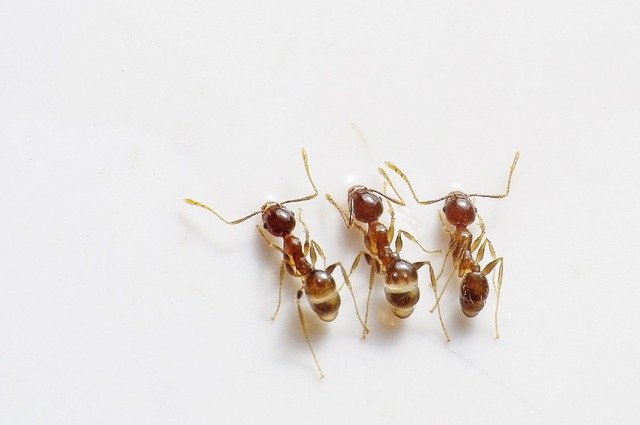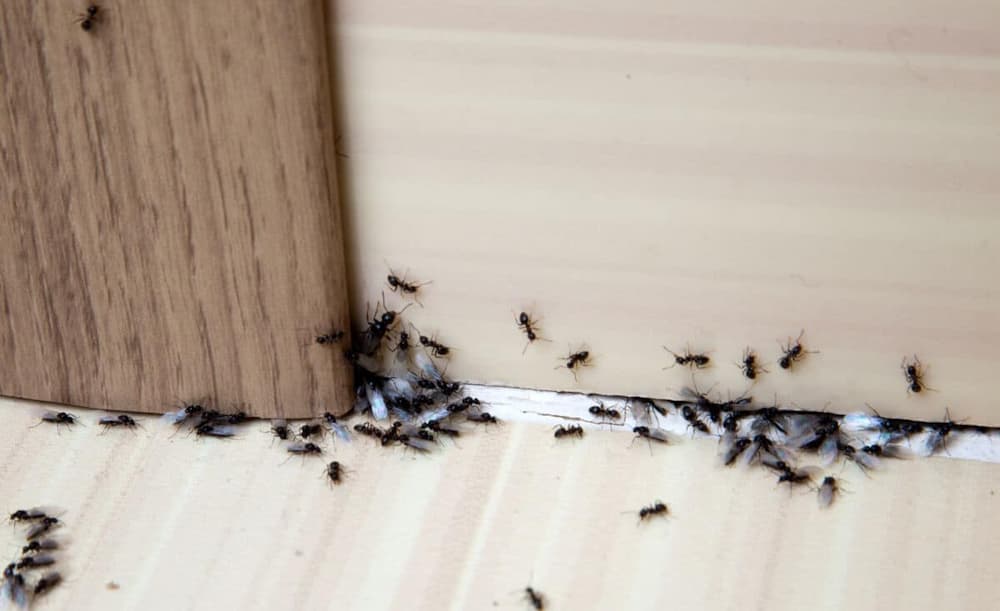Curious to find out if salt kills off ants?
Does salt kill ants?
Although salt does not kill ants actually, it does help to keep them away from your house and repel them.
When it comes to food, ants are drawn to salt in their environment, but if there is too much salt present, they will be repulsed by it. This means that if you sprinkle salt outside your home’s entrance, they will be less likely to enter.
For more information, keep reading.
Table of Contents
Do Ants Eat Salt?
Ants do consume salt; in fact, some studies indicate that they favor salty over sweet snacks. The “line of salt” method is therefore extremely unlikely to be effective and may even draw more ants into your home.
Does Salt Spray Kill Ants?
An even more efficient way to get rid of ants is by using a salt spray. Even though salt does not always kill most ant species, it usually discourages them and gives you some relief from their presence in your house or garden.
Although it varies by species, many different types of ants will avoid crossing over areas treated with a high concentration of salt (about 50%); they usually try to walk around these zones instead.
The ant colony may decide not to invade this area of your property at all if there isn’t another way in.
Even small amounts can help to repel the insects with this method, which works best when applied in large quantities and applied two inches deep.
How Long Does It Take Salt To Kill Ants?
The speed at which the ants perish does depend on the type of salt. Certain salts contain chemicals that can harm an ant’s exoskeleton. This indicates that the ants will become dry and possibly succumb to death very quickly.
Other salts don’t have these same characteristics, so they won’t have the same effect on insects. Your chances are greatly increased if you use a lot of salt because it can damage their outer shells when used in excess.
Dehydration-related death, however, might not happen for several days. It might even fail to completely eliminate the ants.
Are Ants Eliminated By Salt?
It’s not always effective to kill ants with salt. Although salt’s primary function for them is to repel them, some ant species can be killed by it in large quantities.
You should erect a barrier around your house’s entryways in order to keep ants out. Because they do not like to walk on or build their nests on salty surfaces, this will prevent various types of ants from entering your property.
If necessary, salt can also be used in smaller doses inside the house. Just remember to tidy up afterwards, especially if you have animals or young children.

How Does Salt Get Rid Of Ants?
Ants can live without salt. Although salt will keep them at bay, their absence will only be temporary.
When attempting to eradicate an ant infestation, it is crucial to use a lot of salt, though even then, results take time to appear. Additionally, you can make your own salt repellent by combining boiling water with table or rock salt.
Salt Treatment For Ants
In a sense, salt does kill ants.
Ants can be treated naturally with salt. One method that is currently in use is to boil some water and combine regular table salt with it before pouring the mixture into a spray bottle. The mixture is then sprayed liberally throughout the house’s ant-infested areas.
Related:Do ants like vinegar?
Another choice is to combine the salt and boiling water, then pour the mixture directly into an ant hill. Although many dead ants will be produced as a result of this, not all of them may be eliminated. Complex underground tunnel systems can be found in some ant mounds, making them inaccessible to outsiders. Therefore, the only factor that really matters is the size of the ant nest.
JSTOR claims that you can also kill ants by combining a bran, sugar, and salt solution. Simply make a paste by mixing 65% bran, 10% sugar, 25% salt, and water. Even though the mixture kills insects, they are still drawn to it. See how well it gets rid of your ant problem by spreading it around the house or directly into ant-inhabited areas.
How Salt Affects Ants?
Actually, salt can impact ants in a number of different ways.
Because they don’t contain dangerous chemicals that family members and pets can consume, salt and many other natural treatments are popular. It follows that it is not surprising that posts about these treatments occasionally appear in large numbers.
How well do we actually understand these therapies, though? How well do we comprehend salt? It kills ants in what manner?
When Time Magazine published Science: Salt v. the World in 1937, it may have all started. The story concerned Dr. The discovery by Vernon Raymond Haber that a few grains of an uncommon salt called Epsom salt can kill insects. He used Mexican bean beetles to kill them to show how it worked.
There is truth to the article on a microscopic level. Both water and air vapor are absorbed by salt. Therefore, it absorbs moisture when exposed to it. Backyard scientists from all over the blogosphere assert that salt kills insects by zapping their moisture.
Insects such as ants and other creatures breathe through their exoskeletons. According to some theories, salt damages ant exoskeletons by penetrating them. Much like how certain bugs, like snails with a lot of exposed parts and mucus (made of water), can’t stand salt because it causes them to become fatally dehydrated.
Other Natural Methods Of Ant Control
You can try a lot of other natural remedies if salts aren’t the solution to your ant problems.
Tea Tree Oil
There are some insects that tea tree oil is known to kill, and it might also work well to keep ants away.
To prevent ants from settling in, scatter drops across window sills, under doorways, and underneath kitchen appliances.
As an alternative, place tiny dishes of tea tree oil or cotton balls that have been soaked in oil in ant-prone areas.
Lemon Eucalyptus Oil
In addition to being known to keep mosquitoes away, lemon eucalyptus oil (LEO) may also work to keep ants away.
To prevent ants from entering, soak cotton balls in LEO and place them near potential entry points.
White Vinegar
White vinegar has the ability to both kill and deter ants. To get rid of bugs and wipe out their scent trails if you see a line of them marching through your house, use a 50/50 vinegar and water solution on the affected areas.
You can clean your kitchen’s floors, countertops, and other surfaces with the same solution, which could keep ants away for several weeks.
Cornstarch
Cornstarch is a powerful tool for quickly eliminating a significant portion of an ant invasion.
A layer of cornstarch can be used to smother ant colonies, and when water is added, the ants become encased in goo that can be removed and cleaned up.
Skip the water step and use a vacuum to remove the cornstarch-ant mixture for a (slightly) less messy solution.
Coffee Grounds
Ants are reportedly deterred by coffee grounds, but only after they have been brewed.
Sprinkle freshly brewed coffee grounds onto plates or pieces of cardboard, then place them in ant-attractive locations (such as underneath appliances) and other entry points.
Boric Acid
If merely deterring ants isn’t sufficient for you, boric acid will kill them instantly. Boric acid may not be the best option for family homes because it must be kept away from pets and children due to its poisonous nature.
To try boric acid, however, combine it with sugar and water, then soak cotton balls in the mixture. Boric acid will kill ants (and their queen) within three weeks of exposure, so leave them out for ants to find and then sit back and wait.
Peppermint
Menthol, a substance found in peppermint oils, is known to keep a variety of insects away, including ants.
You can help to keep ants out of your home by scattering drops of oil along windowsills, under doorways, and around any other potential ant entry points.
As an alternative, you could scatter cotton balls soaked in peppermint oil or even grow peppermint in your herb garden to ward off insects.
Soap
Ants can be kept out using liquid detergent and hand soap.
This is because soap eliminates the scent trails that ants use to communicate with one another, reducing their propensity to wander indoors.
ritual/Pixabay.com
To get rid of scent trails and to discourage newcomers, apply soapy water to entry points and clean any areas where you have seen ants gathering.
Pepper
Pepper may be used to deter ants since they appear to dislike the spice.
To deter ants from entering your home and your appliances, sprinkle cayenne or black pepper around those areas.
Cucumber
Chemical pesticides should not be used, especially in the kitchen. Food and utensils that are exposed to chemicals will collect chemical particles. Using the removed skin of the cucumber, a safe remedy can be made in the kitchen. Its scent attracts the ants’ attention, working as magic. Place the skins where they usually “eye-ball” and to entrance points they use to come and go.
Perfume
Your favorite fragrance might not actually smell that good to these tiny creatures. To help repel ants, you can use perfumes and essential oils. They could keep ants out of your house. Without having to worry about stains or cleanup after use, the perfume will retain its scent.
To ward off ants and other pests, many people also turn to products like boric acid. However, using boric acid excessively can lead to safety and health issues. Ants, roaches, and other pests won’t be deterred by excessive use of these products.
Cleaning ant pathways and counters can also get rid of food sources that entice ants. Ants will search for the food source by following scent trails left by other ants. Eliminating these pheromone trails will help to confuse them and what attracts ants.
Ants have a plethora of advantages that we should be aware of. In the ecosystem, they do play a significant role. They can be troublesome, though, and they have the potential to seriously harm both people and property. Ideally, you should keep ants away from your house, but if they manage to get inside, a professional exterminator might be necessary.
Frequently Asked Questions
Does Salt In A Table Kill Ants?
While table salt does not kill ants, it can hinder their ability to find food and deter them from entering your home by affecting their ability to forage. Because salt irritates them, ants will seek out other food sources that don’t have salt as a primary ingredient. In addition, they won’t step on the salt.
Can Ants Be Killed By Salt Water?
Ants can be killed by saltwater, but it does not always work. If you flood your problem area with a lot of saltwater and all the tiny insects drink from it, they will all perish within hours or days, depending on how much salt they drank. It is unlikely that a colony as a whole would perish from consuming salty water if only some of them do this. However, it will be challenging to convince them to consume it.
Are Fire Ants Killed By Salt?
Without going overboard, salt won’t kill fire ants. If you want to keep fire ants away from your home, salt is a good fire ant treatment.
Does Epsom Salts Kill Ants?
Although table salt might not be the best weapon against ants, what about Epsom salts?
Epsom salts do not appear to be any more effective at controlling ants than salt, which is a shame.
Although there is little proof that this actually works, some online sources suggest that scattering them around (either dry or combined with a solution) may deter pests.
Conclusion
Salt typically does not successfully kill ants. However, it does appear to be able to repel them and stop more from entering your home.
They are so small and sensitive to water loss, among other things, that this is the case.
Thoughts on how long it takes? It depends on how much time you spend developing a treatment and how much salt you employ.
It’s crucial to keep in mind that there’s a possibility that ants will reappear after being driven away. Various techniques must be used if you want to permanently get rid of ants.
Regarding your reading, I thank you.













